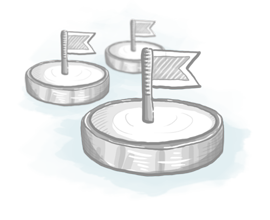Lead generation is a primary activity of any company, for without leads there are no sales. Not only do marketing departments (and in some cases sales forces directly) pay very sharp attention to lead generation internally, but to the outside sourcing of them as well. The provision of quality lead generation is a million-dollar business as enterprises will pay top dollar if it means conversion to top-dollar sales.
Prior to or at least along with the scouting and sourcing of leads, though, it is highly advisable that your marketing department spend some time and money on a very important piece of homework.
Who Is Your Customer?
 The quick answer to that question would of course be, “Someone who would buy our product!” But such an answer is barely scratching the surface and will not result in the obtaining of very good leads.
The quick answer to that question would of course be, “Someone who would buy our product!” But such an answer is barely scratching the surface and will not result in the obtaining of very good leads.
What makes up the prospect or prospect company that would buy your product or service? What kinds of issues do they face, both involving your line of product and otherwise? How does their line of business work? What is their purchasing process? How do they normally go about researching a product or service like yours?
Narrowing it down, what problems would your product or service solve that that competition’s wouldn’t? How does your product rate against the competition both in truth and (most importantly) in the eyes of your prospects?
The degree that you accurately obtain answers, questions such as these is the degree to which you will know how to obtain quality leads. If you haven’t precisely defined what a lead is for your company, how can any lead generation take place?
Lead Quality Means Sales
To the degree a lead is not well-defined, the job of the sales force is made more difficult. The job that should have been done earlier is mainly then left to salespeople—they must further qualify each person contacted to see if they might be interested, then go about interesting them. If the market research is done right to start with, a sales rep can just jump right in and start selling.
An ideal lead is someone the sales rep can call or visit and with relatively little effort begin the sales process. It is someone who will readily be interested in what you have to offer, as opposed to being vaguely interested or not interested at all.
The sales force fully expects Marketing to provide such leads in lead generation process on a regular basis. If Marketing hasn’t taken the time to find out who exactly these people are, however, they’re going to have a great deal of trouble finding them let alone providing them to salespeople.
In-Person Interviews
 One can certainly conduct internet research and obtain some revealing information. But as anyone who has been there will tell you, there is nothing like getting it “straight from the horse’s mouth.”
One can certainly conduct internet research and obtain some revealing information. But as anyone who has been there will tell you, there is nothing like getting it “straight from the horse’s mouth.”
The best possible way to find out all about your prospects is to visit them in person, take them out to lunch or dinner, and really pick their brains. With no hint of a sales pitch whatsoever, find out what would make them want to buy your product. Do this with some scale involved; if you have a nationally available product or service, you’ll want the interviews to number in the thousands as a reliable cross-section of your buying public.
If in-person interviews are impractical, there are other methods such as phone calls, internet chat rooms or social media. Live conversation is best so that you can ask additional questions or obtain clarifications as needed, but in a pinch email or social media postings are certainly better than nothing.
Another important angle that companies utilize is to interview happy customers: what made them buy? What issues were solved by the product or service they bought?
Utilizing Your CRM Solution with Lead Generation
A CRM solution that allows sales rep commentary at each stage of the sales process will be another key way that Marketing can learn more about prospects, and keep learning as time goes by. Such a CRM application also becomes vital in lead generation, tracking and valuing, so a company really can’t do without it.
The lesson to be learned is: the better you know your prospective customer, the easier and more valuable your lead sourcing and lead generation will be. Try it and see.
Click here to discover how a CRM can precisely value and track your leads.




















